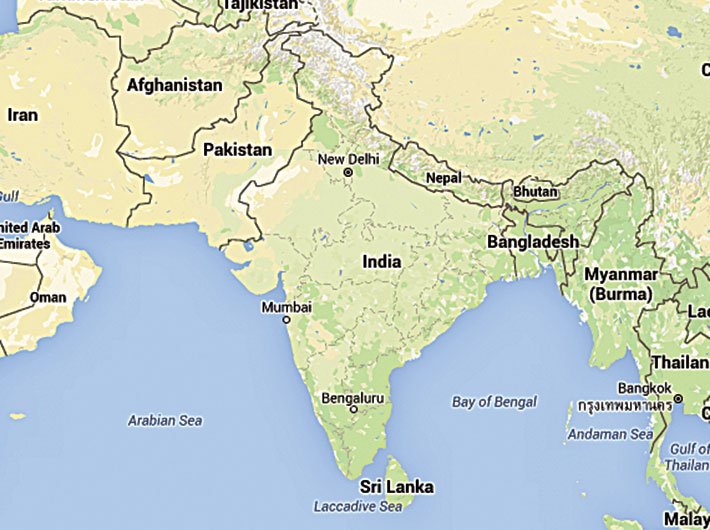In Geospatial Regulation Bill 2016 the government puts technology and entrepreneurship on the back-burner as nationalist concerns take centre stage
Whenever The Economist, the international magazine, publishes a map of India or south Asia, showing parts of Kashmir as ‘disputed territory’, officials sit down and on each and every copy meant for distribution in India they put a stamp mark saying the map is incorrect. The exercise has been followed so religiously that in 2012 the magazine accused India of being more intolerant on the border representation than China or Pakistan.
And that was the time of the Congress-led government. Bank on the Modi government to find a more rigorous way to put an end to any contentious representation of India’s territory. The next time The Economist wants to publish a map of south India, it will have to think twice – any deviation from the official Indian map can invite a penalty of Rs. 100 crore or a jail term of seven years.
In the process, the state has asserted its ‘ownership’ over the whole territory, to the extent that nobody – be it a commercial entity like The Economist or Google Maps or a citizen like you and me – can freely use or publish any representation, any information, any data of India’s geography without the state’s permission. That means using Google Maps on your phone or ‘geo-tagging’ in social media too would need the Big Brother’s approval first.
That’s what the draft of the Geospatial Information Regulation Bill, 2016, says. Ever since the ministry of home affairs (MHA) released the draft bill on May 4, it has been heavily criticised by industry and technology experts, map enthusiasts, data analysts and many from the scientific community. In its defence, the government has said that the bill is only in its initial stages and has invited feedback from the public until June 4.
As per the draft, the bill aims to “regulate the acquisition, dissemination, publication and distribution of geospatial information of India which is likely to affect the security, sovereignty and integrity of India and for matters connected therewith or incidental thereto”.
This means, once the law comes into force, the government would control dissemination, publication and acquisition of any kind of geospatial information. In simpler terms, things like geo-tagged images, maps, aerial photographs, atlases and car navigation systems, which give location details of the country, fall under the legislation’s purview.
But the minister of state for home, Kiren Rijiju, in an interview to the Economic Times has claimed that the proposed law is aimed at forcing Google Maps to ensure correct depiction of Indian boundaries, as the popular mapping service shows Kashmir and Arunachal Pradesh as disputed territories in its global maps.
Interestingly, just days after the bill was made public, Pakistan raised “serious concern” to the UN over the bill. India told its not-so-friendly neighbour to mind its own business by saying that the matter is “internal”. China, meanwhile, is yet to react.
There is more to the bill than the international boundaries. New technology brings transparency, but it may not be always a welcome thing. Google Maps, based on the satellite data, brings imagery of every part of the country on your computer screen, and that includes military and other security establishments. Armed with the law, the Indian authorities can force it to hide them – as it does in the US. But information regarding such sensitive establishments is already in public domain for long and any drastic move at this stage can only hide future spots, not the existing ones. In any case, ‘blocking’ can be achieved even without an overarching law.
Therefore, the bill is seen as part of the government’s hyper nationalism. In fact, BJP MP Tarun Vijay has even asked the citizens to shun Google Maps and has hailed this step by “the patriotic government of Narendra Modi”.
However, this is one instance when the nationalist ideology goes counter to the tech-savvy image of the Modi regime that promised “minimum government, maximum governance”. It only promotes the Make in India stamp, literally. Crucially, the letter and spirit of the legislation flies in the face of the draft geospatial policy of the department of science and technology, which envisions an open and transparent regime.
Let’s take a look at how the proposed law will only increase the state’s interference and curb innovation and entrepreneurship.
Ch 2, 3(1): Acquisition of geospatial information of India - Save as otherwise provided in this Act, rules or regulations made there under, or with the general or special permission of the Security Vetting Authority, no person shall acquire geospatial imagery or data including value addition of any part of India either through any space or aerial platforms such as satellite, aircrafts, airships, balloons, unmanned aerial vehicles or terrestrial vehicles, or any other means whatsoever.
At first it seems the bill affects only big companies, but a closer look shows that it affects people like you and me as well. If the bill becomes a law then it will be mandatory to obtain permission from the ‘Security Vetting Authority’ before we indulge in any harmless social media activity – like routine Facebook check-ins, sharing satellite images and aerial photographs, GPS navigation, and checking traffic updates. Also, geo-tagging our daily movements like running, cycling, walking or driving will need the government’s permit.
Crowdsourced information will also be affected in a big way. During the Chennai and Uttarakhand floods, volunteers made crowdsourced maps of affected regions, aiding rescue and relief measures. Now they will first have to take the government’s approval. Remember Facebook’s “I’m safe” feature during Cyclone Hudhud in Andhra Pradesh? Well, now that will violate national security.
Though one can argue that big companies like Google and Microsoft can obtain a licence easily and nobody will then be in trouble for using their services, but the clause of “value addition” makes this draft a bit confusing. If I download a Google Map and make some value additions on it, will I need to take another licence? There is no clarity. Moreover, several map enthusiasts, app developers, cartographers, geographers, and data analysts whose work depends on value addition of readily available maps will be viewed as criminals and not innovators anymore. In such a scenario how can the government promote its Skill India programme?
Also, there is no clarity regarding the third-party entities like Zomato, AirBnB, MakemyTrip, Uber and Ola, which use Google or other maps. Will each company have to take a separate licence and if anyone violates the Act, who will be prosecuted – Google or the third party? Anything related to research and innovation will be restricted. A great boost to the StartUp India mission!
Moreover, the draft bill will also hinder the government’s ambitious programmes like Digital India, Smart Cities, Pradhan Mantri Jan-Dhan Yojana, Pradhan Mantri Adarsh Gram Yojana and many more. The success of these plans depends a lot on real-time satellite data, location and mapping technology. And by location, I don’t mean going to the nearest metro station. ‘Location’ would be critical for sustainable development, planning, and disaster management.
3.(2) Every person who has already acquired any geospatial imagery or data of any part of India... prior to coming of this Act into effect, shall within one year from the commencement of this Act, make an application along with requisite fees to the Security Vetting Authority for retaining such geospatial information and grant of licence thereof.
There is no mention about the amount of the licensing fee. Here one can assume that big companies might be in a position to pay fee, but can small companies and startups be able to afford the fee? Also, will it be a one-time fee or every new value addition will require an additional charge? Quite a setback to the Skill India mission.
3.(3) The Security Vetting Authority shall, within three months from the date of receipt of an application made under sub-section (2), either grant a licence with such conditions as may be specified thereon or reject the application as the case may be after examining the application in terms of the guidelines.
The acceptance or rejection of an application depends upon the big brother, Security Vetting Authority, which under the present government, as we have seen in other cases, can choose its own reasons and logic to accept or reject.
Also, the authority will take three months. So if a publisher wants to print India’s satellite image in a news item, then either it has to think three months in advance and obtain a licence or it will have to wait for three months. In this age of real-time reporting the bill might not work. News and media companies will be in a big mess.
Moreover, there are no criteria mentioned under which the licence can be rejected. The interpretation of “national security” will depend solely on the whims and fancies of the government, like we have seen in cases where eating beef, raising slogans against India, criticising the government have been seen as threat to national security.
3.(4) No person shall continue possession of geospatial information of India, after rejection of the application by the Security Vetting Authority under sub-section (3) above or after dismissal of appeal, if any, by the Appellate Authority or the High Court or the Supreme Court, as the case may be, whichever is later.
In this digital age when a gigantic amount of data is stored in the cloud and a variety of devices are interconnected, it is virtually impossible to ensure the rejected matter is destroyed – even if you wish to be a law-abiding citizen.
4. Dissemination, Publication or Distribution of the Geospatial Information of India - Save as otherwise provided in this Act... no person shall disseminate or allow visualization of any geospatial information of India either through internet platforms or online services, or publish or distribute any geospatial information of India in any electronic or physical form.
One can now forget sharing random Twitter geo-tagged photos and maps. Sharing location with anyone else without the government’s consent will become illegal. But there is no clarity as to what will happen to the numerous government-launched policing apps, especially for women’s safety. Many of such apps require real-time location sharing and the proposed bill can hamper such services.
5. Use of Geospatial Information of India outside India - Save as otherwise provided... no person shall, in any manner, make use of, disseminate, publish or distribute any geospatial information of India, outside India, without prior permission from the Security Vetting Authority.
This means no one can distribute India’s geographic information outside the country without prior approval. Also no foreign company will be able to use India’s information without a licence. It remains to be seen how this can be applied to foreign companies dealing with foreign clients (including in Pakistan and China).
6. Wrong depiction of map of India etc.- No person shall depict, disseminate, publish or distribute any wrong or false topographic information of India including international boundaries through internet platforms or online services or in any electronic or physical form.
This means no one can meddle with the map of India. Magazines like National Geographic, The Economist and various atlases which often publish India’s map will now be required to take permission. The bill also restricts the usage of maps for recreation and information sharing purposes.
Since maps are dynamic in nature, the bill needs to provide clarity whether a new permission will be needed every time a map is updated.
ridhima@governancenow.com
(The article appears in the June 1-15, 2016 issue)

